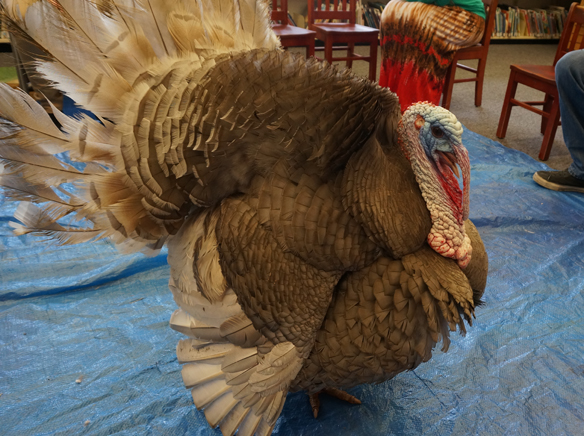For most people, the closest they have ever gotten to a real turkey is the family dinner table at Thanksgiving. But Blue the Therapy Turkey aims to change that.
For most people, the closest they have ever gotten to a real turkey is the family dinner table at Thanksgiving. But Blue the Therapy Turkey aims to change that.
Blue is the 35-pound pride and joy of Marsha Edwords, a Lakeside resident and farmer. Marsha was raised on a farm and loves animals, particularly turkeys. Her collaboration with Blue began about two years ago, when Marsha received a unique Christmas present from her daughter—a trip to Valley Center to replace a beloved pet turkey that had recently died. There, Marsha had a wide variety of turkeys to choose from, finally settling on a six-month-old male Blue Slate Heritage Turkey. The choice of name was obvious.
Blue Slates are a relatively rare turkey breed and are considered threatened. Recognized since 1874, their numbers once dwindled to only about 100 in the world, though today the population has increased to nearly 10,000. These are not the turkeys bred for the dinner table. Considered a “Heritage Turkey,” a type of domestic turkey that retains “historic characteristics” that no longer exist in turkeys raised for consumption they are more likened to the wild turkey. Their life span is seven to 10 years.
Turkeys live to wander and explore, constantly searching for anything on the ground that they might eat. Fruits, vegetables, insects, leaves, and commercial turkey food will fill that bill. Their habits can keep the bugs under control.
Turkeys are actually rather intelligent birds. Wild turkeys have been known to move to safer ground during hunting season. At his new home, Blue learned to push open the gate that secured his yard and escape. They are even trainable to act as a guard or even an attack turkey, as they have very large, clawed feet and can be quite imposing once they are aggravated.
Turkeys can fly quite well. Blue and his five wives must have their feathers trimmed regularly or they could fly the coop, so to speak. At dusk, Blue and his crew automatically move into their turkey house to be secured for a safe night’s sleep.
Blue was about six months old when he first laid eyes on Marsha. Turkeys will bond with a human at a very young age and particularly well with children. Once bonded, they imprint on that individual for life. Now when he sees her, Blue immediately heads for Marsha. The sound of her voice often results in a loud “gobble.” Once she got to know Blue, Marsha felt he had “a gentle soul.” She thought he might be good as a therapy animal.
Animal Assisted Therapy has actually been around for a quite a while. Various animals have been used for therapy, including domesticated pets, farm animals, and even marine mammals. The goal is to calm emotions, social settings, or even cognitive functions. For the past year, Blue has been busy visiting with young and old folks alike. At a senior assisted living home, a 100-year-old woman was tickled to pet a turkey for the first time in her long life. Children get a kick out of him as well. One family hired Blue as a surprise guest at their annual Thanksgiving gathering. Fortunately for Blue, he was not bred to be a holiday treat.
When he is the center of attention, Blue turns on the charm. He shows off by puffing out his feathers (looking more like a traditional turkey). This substantially increases his perceived size. His head turns from blue to red and his “snood” – the dangling piece of skin that droops over his beak – elongates from a little nub to several inches in length. Blue becomes very animated. He grunts and shuffles his feathers as he struts about, sometimes dancing and often letting loose with a loud turkey call. Blue will definitely get your attention.
Blue is available for therapy visitations. Marsha and her husband Richard can be reached at (619)507-4178.
“Country Living: Let’s Talk Turkey” was part of a series of Saturday programs held at and sponsored by the Lakeside Branch Library, located at 9839 Vine Street in the community of Lakeside. Check their online site for future program dates and times at WWW.SDCL.ORG/LOCATIONS_LK.HTML. All events are free.















Appreciate it for this post,
Appreciate it for this post, I am a big big fan of this web site would like
to go on updated. http://ssl.netidc.com/?a%5B%5D=%3Ca+href%3Dhttp%3A%2F%2Fradboxstudio.com%2Fpsi-wars-wiki%2Fdoku.php%3Fid%3Dnatu_al_he_bal_t_eatments_fo_glowing_skin_that_wo_k%3EWrinkle+Couture+Skin+Care%3C%2Fa%3E
Appreciate it for this post,
Appreciate it for this post, I am a big big fan of this web site would like to go
on updated. http://ssl.netidc.com/?a%5B%5D=%3Ca+href%3Dhttp%3A%2F%2Fradboxstudio.com%2Fpsi-wars-wiki%2Fdoku.php%3Fid%3Dnatu_al_he_bal_t_eatments_fo_glowing_skin_that_wo_k%3EWrinkle+Couture+Skin+Care%3C%2Fa%3E
Hello. splendid job. I did
Hello. splendid job. I did not expect this. This is a fantastic story.
Thanks! http://inpc8.wow64.net/Affordable_Skin_And_Hair_Care_Product_For_Beautiful_You
Hello. splendid job. I did
Hello. splendid job. I did not expect this.
This is a fantastic story. Thanks! http://inpc8.wow64.net/Affordable_Skin_And_Hair_Care_Product_For_Beautiful_You
Wonderful work! That is the
Wonderful work! That is the kind of info that are supposed to be
shared around the net. Disgrace on Google for no longer positioning this publish higher!
Come on over and talk over with my site .
Thank you =) http://sr23.ru/Luxe_Derme_Creme_8417688
Wonderful work! That is the
Wonderful work! That is the kind of info that are supposed to be
shared around the net. Disgrace on Google for no longer positioning this publish higher!
Come on over and talk over with my site . Thank you =) http://sr23.ru/Luxe_Derme_Creme_8417688